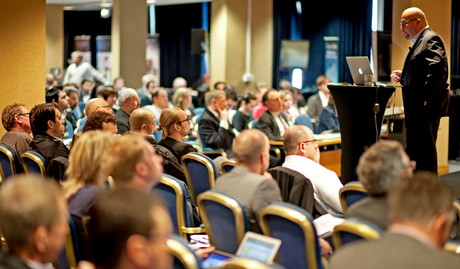"Old-Fashioned" Internet? Media World Changes Faster Than Ever
"Old-Fashioned" Internet? Media World Changes Faster Than Ever
2011-04-14
When a speaker at a media conference refers to the traditional desktop-based internet as "the old-fashioned internet," you know that the media world is evolving faster than ever.
In language that was once reserved for newspapers, the PC-based internet took a back seat to mobile and tablets at the just-completed Digital Media Europe conference, which drew nearly 250 participants from 38 countries to London this week.
The reach of the new mobile web was evident in the room itself. Those 250 participants had 309 devices connected to the conference Wi-Fi.
But while the internet may be relatively old-fashioned, the challenge it poses for traditional media companies is as fresh as ever.
"You have to face the same problems on mobile that you face on the internet, so mobile won't save us and Steve Jobs is not our saviour," says Morten Holst, Strategy and Business Advisor for VG Multimedia in Norway. "We have to solve the internet problem. When we convert a newspaper reader to the web, then we lose 70 percent of the revenues. When we convert internet users to mobile, you lose 70 percent again. But we don't have a choice, because our readers expect us to be there. But we have to solve this problem."
The companies featured at the conference – Bloomberg, A&N Media, Samsung, Google, Bonnier, Axel-Springer, Ringier, Yelp, Panfu and many others – are seeking to do just that, with a wealth of new business models and projects for generating revenue on full display (summaries of all presentations can be found at http://tinyurl.com/5rv39hm ).
Mr Holst's VG, for example, thinks mobile and web TV hold promise, "You don't need to launch a satellite to provide TV, which reminds me of our own situation – you don't have to own a press to publish. This allows other players to enter the market."
But as yet, there isn't enough revenue to replace revenues being lost to print, he says. "In a couple of years, we'll look more like a TV station. But we won't do it if we can't find the revenues … . We're looking for the big revenues."
The projects and strategies examined during the three-day Digital Media Europe conference, organised by the World Association of Newspapers and News Publishers (WAN-IFRA), included both traditional content but also completely new businesses, as newspaper companies seek new revenues to help support their core and essential product: quality, credible journalism.
Politiken in Denmark, for example, is not only Denmark's leading quality daily but also the country's leading retailer of bicycle helmets. Its readers include a lot of bicycle riders, so why not sell them helmets? Likewise, A&N Media's Metro has found a new business in apps and games designed to appeal to readers of Metro. For many companies, offerings that leverage the core brand into peripheral products is providing new revenue streams.
"As long as (the product) is in line with our values, we can go along with it," said Anders Emil Moller, Director of Digital Development for JP/Politiken Hus. "The users, formerly known as readers, are not surprised by the offer of buying a helmet or a book of the month, because that's part of our values already."
If one message emerged from the conference, it was that the powerful and credible brands of traditional media companies, along with their unique content, are their unique selling points, and that future success must involve the exploitation of these brands across platforms and businesses.
"The brand is central to us, we've built up our brands over hundreds of years," said Henry Faure Walker, Digital and Business Development Director of Johnston Press in the United Kingdom. "Our strategy is, if we are developing on mobile, which we are, or on the old-fashioned internet, it will be about our brand."
Summaries of all conference presentations can be found at http://tinyurl.com/5rv39hm
The WAN-IFRA Magazine EXTRA on tablet publishing can be found at http://tinyurl.com/5s88gp8
WAN-IFRA, based in Paris, France, and Darmstadt, Germany, with subsidiaries in Singapore, India, Spain, France and Sweden, is the global organisation of the world’s newspapers and news publishers. It represents more than 18,000 publications, 15,000 online sites and over 3,000 companies in more than 120 countries. Its core mission is to defend and promote press freedom, quality journalism and editorial integrity and the development of prosperous businesses.
Inquiries to: Larry Kilman, Director of Communications and Public Affairs, WAN-IFRA, 7 rue Geoffroy St Hilaire, 75005 Paris France. Tel: +33 1 47 42 85 00. Fax: +33 1 47 42 49 48. Mobile: +33 6 10 28 97 36. E-mail: larry.kilman@wan-ifra.org
Author information

Larry Kilman
Secretary General
WAN-IFRA
| Paris,
France
Phone: ++33-147428507
E-Mail: larry.kilman@wan-ifra.org

